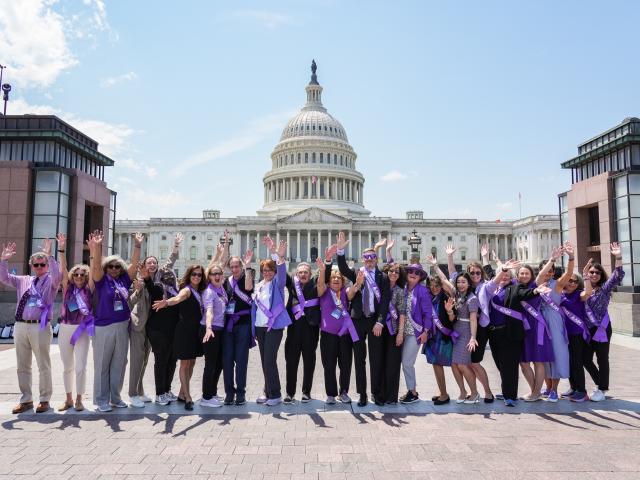WASHINGTON, D.C., December 16, 2019 - Bipartisan Congressional leaders have announced a $350 million increase for Alzheimer's and dementia research funding at the National Institutes of Health (NIH) for fiscal year 2020. If signed into law, funding would reach $2.8 billion, a more than six-fold increase of funding since the passage of the National Alzheimer's Project Act (NAPA), legislation championed by the Alzheimer's Association. In addition to the research funding increase, the bill includes $10 million to implement the BOLD Infrastructure for Alzheimer's Act (P.L. 115-406).
"We are incredibly grateful to Congressional champions for their support and we are proud of the relationships our advocates have built with all members of Congress to demonstrate the need for research and the impact it will have on their families and future generations," said Robert Egge, Alzheimer's Association chief public policy officer and Alzheimer's Impact Movement (AIM) executive director.
As a result of these significant increases, scientists are able to work at a more rapid pace to advance basic disease knowledge, explore ways to reduce risk, uncover new biomarkers for early diagnosis and drug targeting, and develop potential treatments.
Alzheimer's Association and AIM advocates have been relentless in their efforts to grow support for this research funding increase and funding of the BOLD Infrastructure for Alzheimer's Act, having held thousands of meetings with Members of Congress. Congressional champions including Sen. Roy Blunt (R-Mo.), Sen. Patty Murray (D-Wash.), Rep. Rosa DeLauro (D-Conn.) and Rep. Tom Cole (R-Okla.) once again were true leaders and partners securing today's advancements.
Today's announcement is also the next step in an important process to ensure the BOLD Infrastructure for Alzheimer's Act is fully implemented. Passed overwhelmingly in December 2018, the law directs the Centers for Disease Control and Prevention (CDC) to strengthen the public health infrastructure across the country by implementing effective Alzheimer's interventions focused on public health issues such as increasing early detection and diagnosis, reducing risk, and preventing avoidable hospitalizations. It establishes Alzheimer's and Related Dementias Public Health Centers of Excellence, providing funding to state, local, and tribal public health departments, and increasing data analysis and timely reporting.
The bill is expected to pass both chambers of Congress and be signed into law by the president by the end of the year.
